unit2
unit 2 单词(完整)
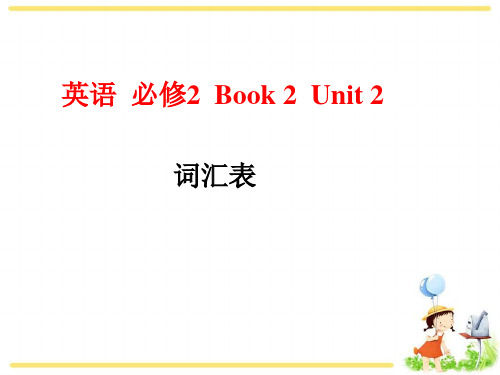
1.容许,准许……进(加)入 a.Only one hundred boys are admitted to/into
the school every year.
每年学校准许100名男生入校。
b.He is admitted as a member of the basketball team.
他被接受成为篮球队的一名队员。
4. take part in 参加;参与
They often _____ take _____ part ____ in outdoor
activities.
他们经常参加室外活动。
take part in join in join
参加活动,并在其中起 积极作用 参加小规模的活动如 “球赛、游戏”等 加入某人或某个组织成 为其中一员 参加会议、婚礼、典礼; 听报告、讲座
英语 必修2 Book 2 Unit 2
词汇表
1. ancient ['eɪnʃ(ə)nt] adj. 古代的.古老的 2. compete [kəm'piːt]vi. 比赛;竞争
petitor [kəm'petɪtə]n. 竞争者
The cycle of learning vi. 比赛;竞赛 compete [kəmˈpi:t] competitive [kəmˈpetətɪv] adj.竞争的 n. 比赛,竞赛 competition [ˌkɒmpəˈtɪʃn]
stand by sb.
反对
支持某人
辞职
stand out stand against
stand down
袖手旁观,支持
显眼,突出
7. △ mascot ['mæ skɒt] n 吉祥物
Unit 2 课文翻译
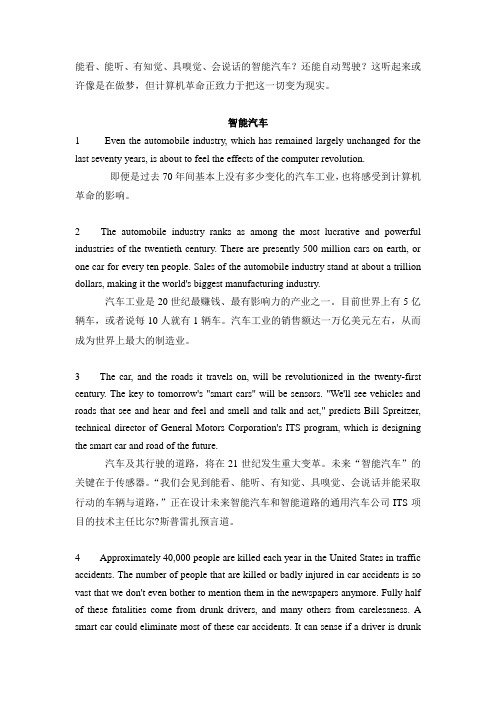
能看、能听、有知觉、具嗅觉、会说话的智能汽车?还能自动驾驶?这听起来或许像是在做梦,但计算机革命正致力于把这一切变为现实。
智能汽车1 Even the automobile industry, which has remained largely unchanged for the last seventy years, is about to feel the effects of the computer revolution.即便是过去70年间基本上没有多少变化的汽车工业,也将感受到计算机革命的影响。
2 The automobile industry ranks as among the most lucrative and powerful industries of the twentieth century. There are presently 500 million cars on earth, or one car for every ten people. Sales of the automobile industry stand at about a trillion dollars, making it the world's biggest manufacturing industry.汽车工业是20世纪最赚钱、最有影响力的产业之一。
目前世界上有5亿辆车,或者说每10人就有1辆车。
汽车工业的销售额达一万亿美元左右,从而成为世界上最大的制造业。
3 The car, and the roads it travels on, will be revolutionized in the twenty-first century. The key to tomorrow's "smart cars" will be sensors. "We'll see vehicles and roads that see and hear and feel and smell and talk and act," predicts Bill Spreitzer, technical director of General Motors Corporation's ITS program, which is designing the smart car and road of the future.汽车及其行驶的道路,将在21世纪发生重大变革。
Unit 2 知识点提要

8A Unit 2 知识点提要一、词汇1.广告可n. advertisement ▲(an/-s)2.英国的adj. British3.美国的adj. American4.饼干可n. <英> biscuit (a/-s)、<美> cookie (a/-s)5.卡车可n. <英>*lorry ▲(a/lorries)、<美> truck (a/-s)6.橡皮可n. <英> rubber (a/-s)、<美>eraser ▲(an/-s)7.足球可n. <英> football (a/-s)、<美> *soccer (a/-s)8.假期可n. <英> holiday (a/-s)、<美> vacation (a/-s)9.秋天可n. <英> autumn (a/-s)、<美> fall (a/-s)下落;跌倒;倒塌↓v. fall→三单:-s →▲过去式:fell →▲现分:-ing10.商店可n. <英> shop (a/-s)、<美> store (a/-s)11.院子可n. <英> garden (a/-s)、<美> y ard (a/-s)12.电影可n. <英> film (a/-s)、<美> movie (a/-s)[典型例题]( ) 1. People in the UK say biscuit while people in the USA say ______.A. cakeB.cookieC.eraserD.soccer( ) 2. Which sentence is likely (可能) to be spoken by Americans?A. David Beckham is a popular soccer star.B. The shop sells different kinds of biscuits.C. It doesn’t rain often in this city in autumn.D. The film is very popular.( ) 3. If you are an Englishman, you may say “__________ ”A.I want some cookies.B. Autumn is coming.C. Can I borrow your eraser?D. He often plays soccer with his friends.13.男女混合的,混合的adj. *mixed★一所混合学校a mixed school混合v.8AU4mix →▲三单:-es →过去式:-ed →现分:-ing把A与B混合mix A with B把...混合在一起8AU4mix ... together14.法语不可n. &法国人可n.(a/-s) &法国(人)的adj.8BU4French法国可n. France (a/-s) 常用单数15.外国的adj. foreign (not in or from your own country)外国人可n. foreigner (a/-s)16.语言可n. language (a/-s) (words used in speaking and writing)区分:青少年可n. *teenager (a/-s)17.在…期间prep. during18.讨论,议论v. discuss (talk about something)→▲三单:-es →过去式:-ed →现分:-ing★与某人讨论某事discuss sth. with sb.讨论可n.8BU5 discussion (a/-s)19.在课堂上(短语)in class20.<口>家伙可n. *guy (a/-s)21.<口>好朋友;搭档可n.*buddy ▲(a/buddies)22.主动提出,自愿给予v. offer (give something to someone)→三单:-s →过去式:-ed →现分:-ing★为某人提供某物(2种)offer sth. to sb.= offer sb. sth.★给某人某物(2种)give sth. to sb.= give sb. sth.23.结束v. end →三单:-s →过去式:-ed →现分:-ing终止;末尾;终点可n.7BU8end (a/-s)24.棒球可n. baseball (a/-s)25.赢得;赢,获胜v. win (be best or first in a competition)→三单:-s →▲过去式:won →▲现分:winning获胜者可n. winner (a/-s)26.最少的;最小的adj. (little的最高级) least27.至少,不少于(短语)at least28.至多,不超过(短语)at most29.较远(的)/更远(的) adj.&adv. (far的比较级) farther/further★further常考固搭(5种)进一步学习/研究further study/ research 进一步讨论further discussion更多的信息further information 其他的问题further questions再往前/下走8BU3further on/ down30.最远(的) adj.&adv. (far的最高级) farthest/furthest31.花费(时间或金钱) v. spend →三单:-s →▲过去式:spent →现分:-ing★★★★★“花费”公式(4种)It/事takes/took sb. 时间段to do sth.人spend(s)/spent时间段/金钱on sth.(in) doing sth.人pay(s)/paid(金钱)for sth.物cost(s)/cost sb. 金钱(A.takes; spendsB. takes; costsC. costs; costsD. spends; takes( )2. [基础题]The trip to the zoo _______ us about one hour by underground yesterday.A. paidB. tookC. spentD. cost( )3. [易错题]This dress is too expensive, it ____ me 2000 yuan.A.takesB. spendsC. paysD. costs( )4. [难题]He tries to spend as much time as he can ____ computer games.A. playB. playsC. playingD.to play32.制服可n. *uniform ★(a/-s)穿校服wear a school uniform= wear school uniforms33.国际象棋不可n. chess34.每日的,日常的adj.&日报n. daily35.每周的adj. weekly36.快的adj. quick 比较级:-er 最高级:the -est快地adv. quickly比较级:more ~ 最高级:the most ~慢的adj. slow 比较级:-er 最高级:the -est慢地adv. slowly比较级:more ~ 最高级:the most ~37.自始至终,从头到尾&(内部)穿过7BU6 prep. th r ough区分:though/although prep. 尽管thought v. 认为(think的过去式)38.浏览,快速查看(短语)look through39.真实的,真的adj. real真实地;确实,的确adv. really40.起初,首先(短语)at first41.继续/重复做某事(短语)keep (on) doing sth.[拓展] “继续做某事”(4种)keep (on) doing sth.= continue doing sth.= carry on doing sth. = carry on with sth.42.完成;结束v. finish →▲三单:-es →过去式:-ed →现分:-ing★完成做某事finish doing sth.43.午餐时间不可n. lunchtime★在午餐时间at lunchtime44.物理(学) 不可n. physicsPhysics _______ (be) a useful subject, the student must learn it wisely and well.45.羽毛球运动不可n. *badminton[总结] ★★★常考冠词题play+球类、棋、牌、中国乐器 e.g. play baseball/badminton/chess/cards/erhu(二胡) play the+西洋乐器 e.g. play the piano/violin/guitar/drums(鼓)46.理想的adj. *ideal★一所理想的学校an ideal school区分:想法,主意,思想可n. idea▲(an/-s)二、语言点1.(某人)为什么不做某事Why don’t/doesn’t/didn’t sb do sth. =why not do sth.2.like作动词意为“喜欢”,作介词意为“像”(无时态、人称、数的变化)be like 像;look like 看起来像像做某事be like doing sth.—What is your school life like?—It is like _______ (live) in a big garden.( ). Tom, _____ his brother, _____ playing basketball after school.A.like; likesB. like; likeC. likes; likesD. likes; like3.little “几乎没有”,修饰不可n. a little “有一些”,修饰不可n.few “几乎没有”,修饰可n.复 a few“有一些”,修饰可n.复4.你想要做某事吗?Would you like to do sth. ?肯定回答:Yes, I’d like/love to. 否定回答:I’d like/love to, but……5.做某事玩得开心have a good/great/nice/lovely/wonderful/fantastic time doing sth.有很多much/lots of/a lot of没有have no有更多时间做某事more time to do sth.有更少less有一段some time[典型例题]( )1. —Hey, guys. Do you often have a good time _____ after-school activities?—Of course, we do. And we always have a lot of time_____ soccer.A. to do; to practiseB. doing; to practiseC. to do; practisingD. doing; practising( )2.Amy had a lovely time ____ one place after another in Shanghai and she had much time _____ the city.A. to visit; to enjoyB. visiting; to enjoyC. to visit; enjoyingD. visiting; enjoying( )3.Linda had a great time ____ with her friends, and they also had some time ____ about their studies last weekend.A.to talk; to talkB. to talk; talkingC. talking; to talkD. talking; talking6.练习做某事practice doing sth.( )1. My brother enjoys __________ the piano in the music room.A.practice playingB. practice playC. practicing playingD. practice to play( )2. The two girls always have a good time ________ the piano together.A.practice to play B.to practice to play C.to practice playing D.practicing playing( )3. [难题]We should spend as much time as we can __________ English every day.A. practice speakingB. practice to speakC. on practicing speakingD. practicing speaking7.给某人买某物buy sth. for sb.= buy sb. sth.8.在几年级(2种)in Year/Grade+基数词= in the+序数词+year/gradee.g. 在八年级______________________= ______________________(思考:如果改用阿拉伯数字呢?)9.单个动名词作主语,谓语动词用单数As we all know, using public chopsticks ________ (be) necessary when we eat with others.10.“借”(3种)borrow/borrowed 借入borrow sth. from sb.从某人那借来某物lend/lent 借出lend sth. to sb.= lend sb. sth.把某物借给某人keep/kept 借用keep sth. for+时间段借用某物一段时间How long提问①(for)+时间段①since +时间点①since 从句How soon提问in +时间段How far提问路程①实际距离 e.g.500 metres①s’ walk/ ride /drive /flight(航行) /bus ride /car ride/ train ride①时间段+交通方式e.g. 15 minutes by bus How often提问频率①次数+a+时间单位 e.g. twice a week①every+时间单位 e.g. every day③频度副词7个:always总是、usually通常、often经常、sometimes有时、seldom很少、hardly几乎不、never从不( )1—How far is it from your home to your school? —________.A.On foot B.I can take a bus there C.It’s about half an hour D.About ten minutes’ walk( )2.— How long have you had the bike? — ______ two years. A.in B.until C.since D.for ( )3.— How soon will these waste bottles be recycled?—_________. I have called the recycling company. A.For an hour B.An hour ago C.After an hour D.In an hour( )4.—_________ do you go to the concert? — Always, because I’m interested in it.A.How longB. How soonC. How oftenD. How far( )5. —________ is it from here to your home town? — Well, it takes over three hours to get there by coach. A. How soon B. How much C. How long D. How far( )6.—________do you have after-school activities? —Twice a week.A.How long B.How far C.How often D.How soon( )7. [易错题]—________ do you hear from your parents a week? —At least twice a week.A. How many timesB. How soonC. How oftenD. How long12.一篇由一个美国男孩写的文章an article (written) by a boy from the USA13.the number of…“…的数量”作主语,谓V.用单数;a number of…“许多”作主语,谓V.用复数( ). —A number of volunteers ________ willing to teach in China’s rural areas(农村地区).—Yes, the number of them _______ getting ________.A. is; are; more and moreB. are; is; larger and largerC. is; is; bigger and biggerD. is; are; more and more14.提问数量的句型(2种)What’s the number of the students in your class?=How many students are there in your class?15.seem“似乎”用法(3种)①seem (to be)+adj. ②seem to do sth. ③It seems that+从句16.[难点]need作动词的2种用法若need是情态动词,need do sth. ; 若need是实义动词,need to do sth.解题关键:如何判断need是情态动词还是实义动词?法一:看三单__________________ 法二:看否定__________________ 法三:看提问__________________ ( )1. Millie ______ her homework at the moment.A. needs not finishB. doesn’t need finishC. need not to finishD. doesn’t need to finish( )2. You needn’t ______ those things if you ______ them.A.buy; needn’tB.to buy; don’t needC.buy; don’t needD.to buy; needn’t( )3. —Does he need ______ there at once ? —No, he ______ leave so hurriedly because he has enough time.A. to go; needB. go; needn’tC. to go; needn’tD.go; doesn’t need17.代词it/one(s)的区分:it同类且同物、one(s)同类不同物( ). —The black dress doesn’t look nice on me. I don’t like _____ at all. —How about the blue _____?A.one; one B.it; one C.it; it D.one; it18.Each of(√);every of(×)19.Each of us ________(have) a book. We each ________(have) a book.20.有一个星期的假期have a week off21.★对每科进行一次月考have a monthly test on each subject22.我的日常生活my daily life23.有很多时间参加课外活动have lots of time for after-school activities24.★有一小时的家庭作业have an hour of homework25.★进行一次学校旅行(2种)go on/for a school trip26.★停止做某事(同一件事)stop doing sth. 停下来去做某事(另一件事)stop to do sth. ( )1. We have worked so long. Let’s stop ______ a rest.A.have B.to having C.having D.to have( )2.My father told me a funny joke and I can’t stop ________ every time I think of it.A.to laugh B.laughing C.from laughing D.Laughmore+可n.复/不可n.+than 比…多less+不可n.+than 比…少fewer+可n.复+than 比…少the most+可n.复/不可n.最多the least+不可n.最少the fewest+可n.复最少。
(Unit 2)词汇巧记
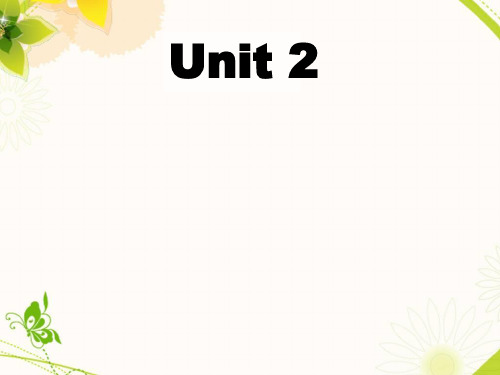
4. gas n. 汽油;气体;煤气;毒气 谐音:该死
记忆法:该死,煤气中毒了。
5. official adj.官方的;正式的;公务的 offic(英文office)办公室; i(英文)我; al(英文all)全部 记忆法:办公室已正式的规定,我是全部员工 的领导。
20. frequent adj.频繁的;常见的 fr(拼音)夫人;e(拼音)鹅;qu (拼音)去; e(拼音)鹅;nt(拼音)难题 记忆法:夫人虽然喜欢吃鹅,但频繁的去买鹅, 也是个难题。
21. usage n. 使用;用法;词语惯用法 us(英文)我们; age (英文)年龄 记忆法:我们对上了年龄的人使用敬语。
27. African adj. 非洲的;非洲人的 africa (英文)非洲;n(拼音)拿 记忆法:在非洲拿非洲人的东西是不好的。
(Unit 2)词汇巧记
28. eastern adj. 东方的;东部的 eas(英文easy)容易;te (拼音)特;rn(拼音)乳牛 记忆法:容易买到东方的特别乳牛。
记忆法:弟弟一乐就用传统方言说话。
25. expression n. 词语;表示;表达 ex(拼音)儿媳;press (英文)逼迫;i(英文)我; on(英文)在……上面 记忆法:儿媳逼迫我在上面做词语练习。 26. midwestern adj.中西部的;有中西部特性的 合成词: mid(英文)中间的; western (英文)西部的 记忆法:中间的加西部的,就是中西部的。
Unit 2
1. subway n. 地下人行道;<美>地铁 su (拼音)苏;b(拼音)伯;way(英文)路 记忆法:苏伯伯过马路走地下人行道。
Unit 2 Start up优质课件

It’s a/an_____.
Start up. What’s this?
It’s a/an_____.
Start up. What’s this?
It’s a/an_____.
Start up. What’s this?
It’s a/an_____.
Start up. What’s this?
Start up.
this
that
Start up. What’s this?
It’s a/an_____.
Start up. What’s this?
It’s a/an_____.
Start up. What’s this?
It’s a/an_____.
Start up. What’s this?
Start up.
The mouse is in the cup. 老鼠在杯子里
Start up.
ben hen ten
This is a pen.这是一个钢笔。
Start up.
This is a pencil case.这是一个文具盒。
Start up.
This is a pencil.这是一个铅 笔。
Start up.
not 不是 No,it isn’t.不,不是。
Start up.
yes 是,对 no不,不是 Is this a book? Is this an eraser?
Is it a/anS_ta_rt_u_p_.?
Yes,it is. No,it isn’t.
Is it a/anS_ta_rt_u_p_.?
Start up.
What’s this? 特殊疑问句 What’s that?
unit 2知识点
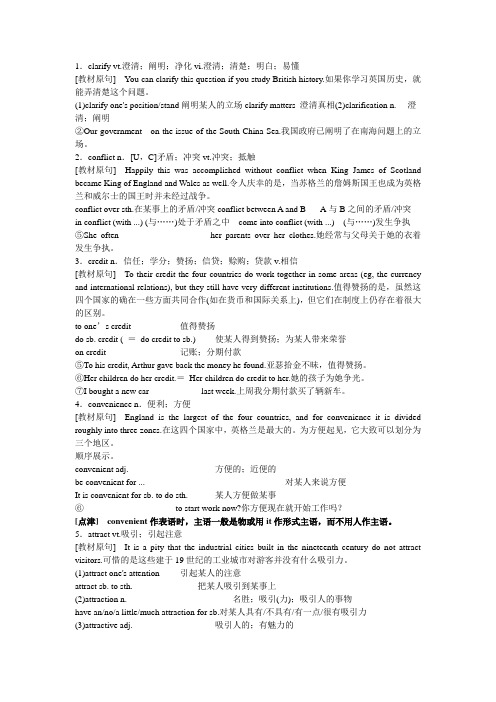
1.clarify vt.澄清;阐明;净化vi.澄清;清楚;明白;易懂[教材原句]You can clarify this question if you study British history.如果你学习英国历史,就能弄清楚这个问题。
(1)clarify one's position/stand阐明某人的立场clarify matters 澄清真相(2)clarification n. 澄清;阐明②Our government on the issue of the South China Sea.我国政府已阐明了在南海问题上的立场。
2.conflict n.[U,C]矛盾;冲突vt.冲突;抵触[教材原句]Happily this was accomplished without conflict when King James of Scotland became King of England and Wales as well.令人庆幸的是,当苏格兰的詹姆斯国王也成为英格兰和威尔士的国王时并未经过战争。
conflict over sth.在某事上的矛盾/冲突conflict between A and B A与B之间的矛盾/冲突in conflict (with ...) (与……)处于矛盾之中come into conflict (with ...) (与……)发生争执⑤She often her parents over her clothes.她经常与父母关于她的衣着发生争执。
3.credit n.信任;学分;赞扬;信贷;赊购;贷款v.相信[教材原句]To their credit the four countries do work together in some areas (eg, the currency and international relations), but they still have very different institutions.值得赞扬的是,虽然这四个国家的确在一些方面共同合作(如在货币和国际关系上),但它们在制度上仍存在着很大的区别。
大学英语教材unit2
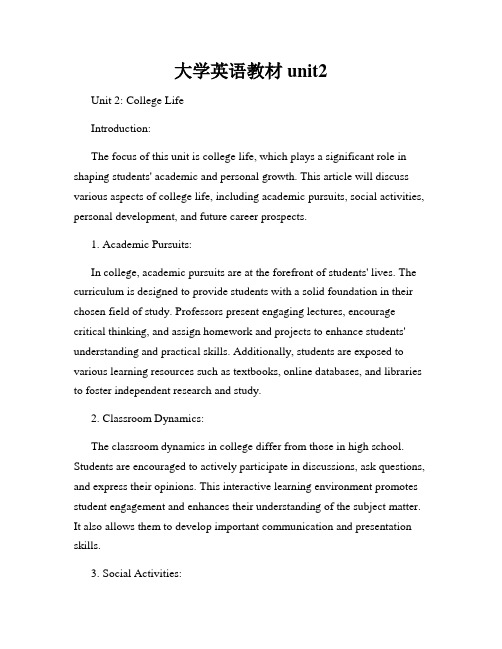
大学英语教材unit2Unit 2: College LifeIntroduction:The focus of this unit is college life, which plays a significant role in shaping students' academic and personal growth. This article will discuss various aspects of college life, including academic pursuits, social activities, personal development, and future career prospects.1. Academic Pursuits:In college, academic pursuits are at the forefront of students' lives. The curriculum is designed to provide students with a solid foundation in their chosen field of study. Professors present engaging lectures, encourage critical thinking, and assign homework and projects to enhance students' understanding and practical skills. Additionally, students are exposed to various learning resources such as textbooks, online databases, and libraries to foster independent research and study.2. Classroom Dynamics:The classroom dynamics in college differ from those in high school. Students are encouraged to actively participate in discussions, ask questions, and express their opinions. This interactive learning environment promotes student engagement and enhances their understanding of the subject matter. It also allows them to develop important communication and presentation skills.3. Social Activities:Apart from their academic commitments, college students engage in various social activities. These activities create opportunities for students to form friendships, develop social networks, and experience personal growth. Student clubs, cultural events, sports teams, and volunteer activities are popular choices for students to actively participate in their college community.4. Personal Development:College life offers a platform for personal growth and self-discovery. Students gain valuable life skills such as time management, organization, and responsibility as they juggle academics, extracurricular activities, and personal commitments. Living away from home and being independent also fosters self-reliance and decision-making abilities.5. Future Career Prospects:One of the primary goals of college education is to prepare students for their future careers. In addition to academic knowledge, college life offers various opportunities for students to develop professional skills. Internships, career fairs, and networking events provide avenues for students to gain practical experience and establish professional connections. Colleges also offer career counseling and guidance to help students explore different career paths and make informed decisions.Conclusion:College life is a transformative period that shapes students academically, socially, and personally. Through academic pursuits, engagement in social activities, personal growth, and future career prospects, students acquire thenecessary skills and experiences to succeed in their chosen fields. The holistic development offered by college life not only prepares students for their professional lives but also helps them become well-rounded individuals.。
必修二unit2单词表
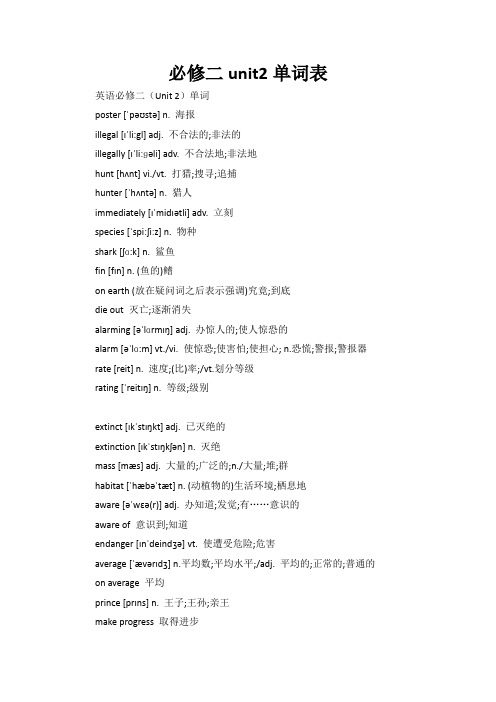
必修二unit2单词表英语必修二(Unit 2)单词poster [ˈpəʊstə] n. 海报illegal [ɪˈli:gl] adj. 不合法的;非法的illegally [ɪˈliːɡəli] adv. 不合法地;非法地hunt [hʌnt] vi./vt. 打猎;捜寻;追捕hunter [ˈhʌntə] n. 猎人immediately [ɪˈmidɪətli] adv. 立刻species [ˈspiːʃiːz] n. 物种shark [ʃɑ:k] n. 鲨鱼fin [fɪn] n. (鱼的)鳍on earth (放在疑问词之后表示强调)究竟;到底die out 灭亡;逐渐消失alarming [əˈlɑrmɪŋ] adj. 办惊人的;使人惊恐的alarm [əˈlɑ:m] vt./vi. 使惊恐;使害怕;使担心; n.恐慌;警报;警报器rate [reit] n. 速度;(比)率;/vt.划分等级rating [ˈreitɪŋ] n. 等级;级别extinct [ɪkˈstɪŋkt] adj. 已灭绝的extinction [ɪkˈstɪŋkʃən] n. 灭绝mass [mæs] adj. 大量的;广泛的;n./大量;堆;群habitat [ˈhæbəˈtæt] n. (动植物的)生活环境;栖息地aware [əˈwɛə(r)] adj. 办知道;发觉;有……意识的aware of 意识到;知道endanger [ɪnˈdeindʒə] vt. 使遭受危险;危害average [ˈævərɪdʒ] n.平均数;平均水平;/adj. 平均的;正常的;普通的on average 平均prince [prɪns] n. 王子;王孙;亲王make progress 取得进步concern [kənˈsɜːn] vt. 涉及;让……担忧concerned [kənˈsɜːnd] adj. 担心的;关切的concerned about 对……关切的;为……担忧的living [ˈlɪvɪŋ] adj. 居住的;活的;在用的;n./生活;生计adapt [əˈdæpt] vi.适应;/vt. 使适应;使适合adapt to 适应measure [ˈmɛʒə] n.措施;方法;/vt. 测量;度量;估量authority [ɔːˈθɒrəti] n. 官方;权威;当权pressure [ˈprɛʃə] n. 压力;要求under pressure 在承受压力whale [wel] n. 鲸antelope [ˈæntɪləʊp] n. 羚;羚类动物Tibetan antelope 藏羚羊reserve [rɪˈzɜːv] n.保护区;储藏(量);/vt. 预订;预留;保留plain [plein] n.平原; /adj. 简单明了的;直率的;平凡的make out 看清;听清;分清herd n.牧群;兽群observe [əbˈzɜːv] n. 观察(到);注视;遵守beauty [ˈbju:ti] n. 美;美人;美好的东西remind [rɪˈmaɪnd] vt. 提醒;使想起remind sb of sb/sth 使某人想起(类似的人或物)fur [fɜː] n. 毛(皮); 毛皮衣服herb [hɜːb] n. 兽群sacred [ˈsekrɪd] adj. s神圣的;受尊敬的shoot [ʃut] vt./vi. (shot,shot) 杀;射伤;发射profit [ˈprɑfɪt] n. 利润;利益watch ove 保护;照管;监督day and night 日日夜夜;夜以继日attack [əˈtæk] n./vi./vt. 攻击;抨击effective [ɪˈfɛktɪv] adj. 有效的;生效的recover [rɪˈkʌvə] vt. 恢复;康复;找回;寻回remove [rɪˈmuv] vt. 去除;移开;脱去intend [ɪnˈtɛnd] vi./vt. 打算;计划;想要threat [θrɛt] n. 威胁threaten [ˈθrɛtn] vt. 威胁;危及exist [ɪɡˈzɪst] vi. 存在;生存harmony [ˈhɑrməni] n.和谐;融洽goods [ɡʊdz] n. 商品;货物creature [ˈkritʃə] n. 生物;动物deer [dɪr] n. 鹿kangaroo [ˌkæŋɡəˈru:] n. 袋鼠reduce [rɪˈdjʊs] vt. 减少due [dju] adj. 由于;因为due to 由于;因为insect [ˈɪnsɛkt] n.昆虫net [nɛt] n.网(=Internet);/adj. 净得的;纯的neighbourhood [ˈneɪbərhʊd] n. 临近的地方;街区binoculars [bɪˈnɑkjəlɚz] n.b双筒望远镜bird field guide 鸟类图鉴search for 捜索;查找dolphin [ˈdɒlfɪn] n. 海豚Yangtze River dolphin 白鳍豚koala [kəʊˈɑ:lə] n. 树袋熊;考拉stir [stɜː] vt. 激发;搅动stir up 激起emotion [ɪˈməʊʃən] n. 感情;情感;情绪skin [skɪn] n. 皮;皮肤unusual [ʌnˈjʊʒʊəl] adj. 特别的;不寻常的Tibetan /tɪ’betn/ adj 西藏的; 藏语的; 藏族(人)的n.西藏人; 藏族人; 藏语Tibet /tɪ’bet/ n.西藏。
- 1、下载文档前请自行甄别文档内容的完整性,平台不提供额外的编辑、内容补充、找答案等附加服务。
- 2、"仅部分预览"的文档,不可在线预览部分如存在完整性等问题,可反馈申请退款(可完整预览的文档不适用该条件!)。
- 3、如文档侵犯您的权益,请联系客服反馈,我们会尽快为您处理(人工客服工作时间:9:00-18:30)。
Unit2 lesson5 I think shopping will change.学案教学目的:1。
掌握将来时的用法…will……/there will be …2.使用将来时预测未来的事情发生。
重点难点:将来时…will…/there will be…掌握和使用在预测实际生活重点词汇:pastime not.. any more play credit card hand robot 重点句型:I think we will travel in flying cars. we won’t use paper. There will be more Internet shopping. There won’t be so much pollution. 重点预览:1.there will be …将来这里即将发生。
There will be changes here. 这里将会有变化There will be flying cars in the future. 在未来这里将会有飞行汽车There won’t be changes here. 这里将不会有变化There won’t be flying cars in the future。
在未来这里将不会有飞行汽车总结;肯定句:否定句:2.Stay(vi)+adj/n保持,总是The weather stayed cold all week. 一周天气都很冷However, some things will stay the same.但是有些事情是不变的3.such as ,for example, and so on 例如,诸如,等等。
People will still travel to popular holiday places such as beaches the mountains.人们还是要去旅游胜地度假比如。
海滩,山脉We like doing some things, for example ,playing basketball, listeningto music.我们喜欢做很多事情比如玩篮球,听歌4. in the future在将来More and more people will have their own cars in the future.不久越来越多的人们有自己的车What do you think will shopping belike in the future?你知道未来的商店是什么样子吗?课前预习:1。
设计未来一天的出行方式和购物方式。
I will travel _____-I will buy food__________.2. 阅读1.2 完成下列练习。
1)。
选择合适标题2)完成1.3的练习3.预测将来的情况,完成2.14.你在阅读中遇到的问题1)————————-2)————————3)——————讲授过程课后作业一.练习册1.2.3.4二.使用将来时的句型描述未来的商店,书店,工作是什么样子的(选择一个)Unit2 lesson6 how will life be different from now?.教学目的:1。
掌握将来时的用法并知道区别…will……/shall …2.使用将来时预测未来的事情发生。
3.学习同意和不同意的功能用语。
重点难点:将来时…will…/shall …掌握和使用在预测实际生活重点词汇:smell increase produce create war final shall English press web page hearing climate demand decline structure boil championship traffic jam重点句型:I think Mike will be late . Mike is going to be late.Shall we eat out tonight? What shall I do next?功能用语:That’s true. Y ou’re tight. I agree. Yes, I think so , too.Maybe you’re right. I don’t agree. I don’t think so.I don’t think it will be possible. I’m not sure about that.重点预览:1.. will../be going to…/shall …将来这里即将发生Will表达预测是基于某种观点作出的预测。
I will come with you if you like.Be going to则基于现在的事实作出的预测。
(侧重事实肯定发生)Sorry,I can’t come out at noon. I am going to be cook for my parents.shall主要用于问句中,通常与第一人称I和we连用。
Shall we put it on a web page?口语中所以人称都可以用will,will可以在问对方是否愿意或者表示客气的邀请时使用。
Will you go to the zoo with me?2 .lead to通向,引起,导致He is repairing the door that leads to the back yard他正在修补通往后院的门I know a short-cut leading to the parking lot 我知道一条通向停车常的路Too much work and too little rest will lead to illness.工作太多,休息太少会导致生病3.Because/because of用法Tom was late because it was rainy outside.因为外面下雨,所以汤拇迟到。
Tom was late because of rain.汤拇迟到因为下雨。
总结: because+ _______ because of+________4.同意和不同意的表达Agreement: Exactly行/ Y ou’re right.你是对的I agree.我同意Y es, I think so, too.是的,我也这样认为Of course.当然了That’s true那是对的,正确的Disagreement: I don’t agree.我不同意I don’t think so.我不这样认为I’m not sure about that.我不大相信那个Of course not. 当然不I think you are wrong。
我觉得你错了。
课前预习:1。
根据问题预测自己的未来并回答,答案1————答案2————答案3————2.分小组讨论2050 年的生活变化,记录中使用,will ..there will be..3.自学2.2 完成2.3的练习讲授过程课后作业一.使用将来时填空will/ shall/ be going to1 .They think they ______(win) the football game.2 .Look at the cloud! It _____ (rain)soon.3. There ______ (be) more Internet shopping in 2050.4.______ we ____(read) the traditional book in the future?二because/because of1.They couldn’t go there____ the changes in cl imate.2._______ We have no money, We have to buy a little milk.三讨论下列的观点,说出你的看法1.I think it’s good idea to go shopping on the Internet.2.I think it’s good way to study without teachers.四。
完成练习册上1.2.3.4。
Unit2 lesson7 His father wanted him to become a lawyer教学目标:1。
掌握不定式的用法2。
了解科幻小说的一般知识。
重点词汇:success league fiction prediction instead of phrase plot novel as follow huge professor nephew\w guide lava advise force重点句型:I want to go shopping . She got up early to catch the train. They advised him to leave. To predict the future is difficult.The most important thing is to understand the rule.Do you know hoe to use a computer?重点预览:1。
JulesV erne朱尔斯,凡尔纳。
(1828--1905)法国科学幻想与冒险小说家。
著名的三部曲《格兰特船长的女儿》(1868)格兰特船长的儿女跟随“扽肯号”战胜无数艰辛,在太平洋一个荒岛上寻找他们失踪的父亲的故事。
《海底两万里》(1870)米描写一阁构造奇特的潜水船船长尼摩,邀请生物学家阿龙纳斯作作海底旅行。
和《神秘岛》(1875)探险者在荒岛上以集体智慧和劳动建立幸福生活的故事。
《环游地球80天》(1873)是最受欢迎的作品,它在科学知识的基础上的大胆的设想和预测未来,所做的许多设想以为后世的实践证实为基本正确。
2. as a result of 结果,由于。
的结果He worked hard, and as a result, he got promoted quickly.他工作努力,被提拔得很快。
He was late for school this morning as the result of the snow.由于下雪他仅早上迟到了He has got a headache as a result of hard work.。
过度的劳累使他头疼。
3.成为现实come trueOne’s dreams do not always come true.He said that I would become a doctor and it has come true now .Y ou will see what I am saying now will come true one day4.不定式的用法。
